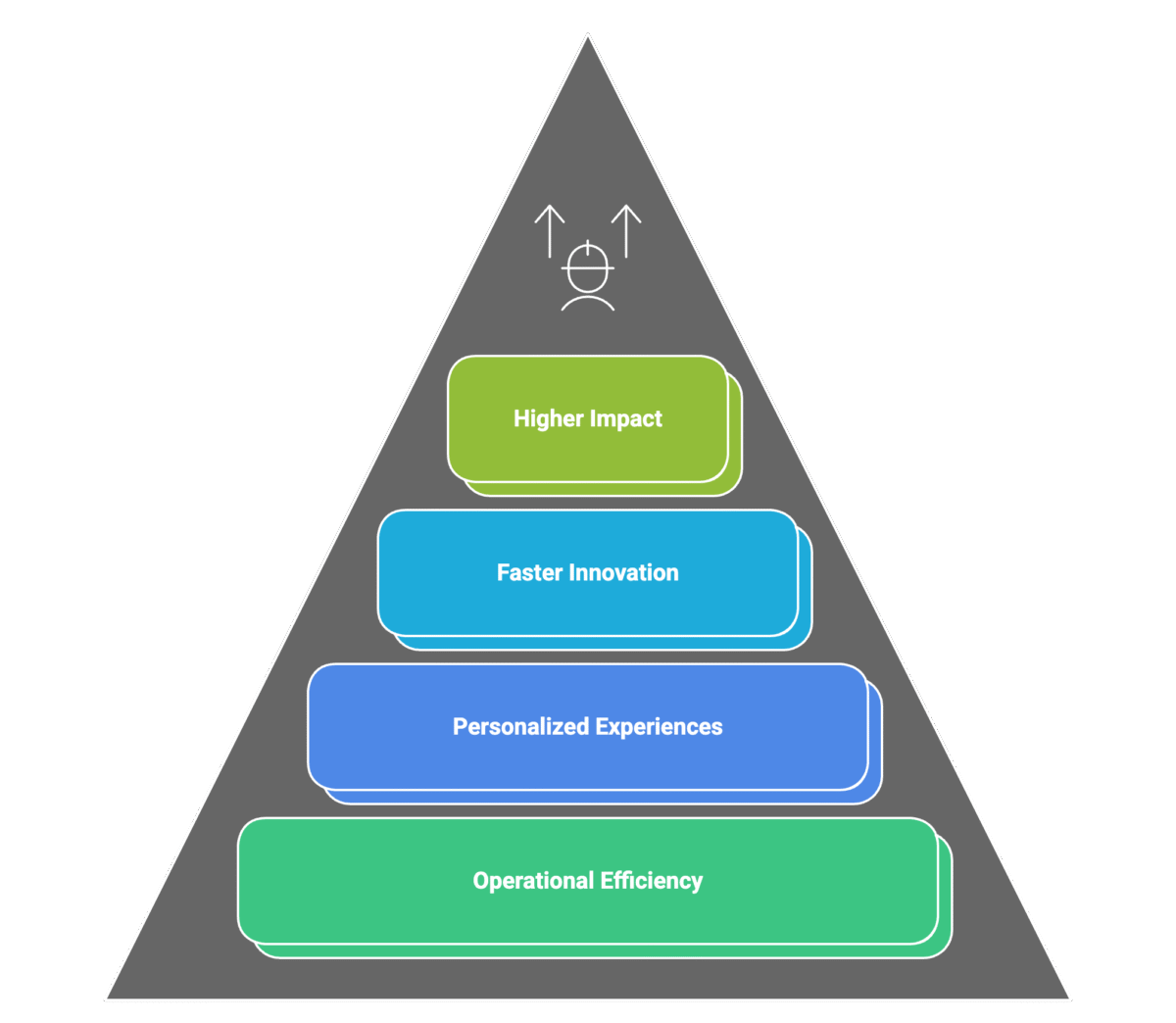Key Takeaways
- Adopt AI tools in daily operations to gain a powerful edge over competitors who are slower to innovate.
- Build new projects with AI prototypes first and use data-driven processes to improve tasks like inventory and customer support.
- Create better customer experiences by personalizing recommendations and support with AI, making shopping more friendly and relevant for everyone.
- Explore how leading companies like Shopify make AI a “must-have” part of their culture, offering a fresh and inspiring perspective for all businesses.
AI has evolved from a “nice-to-have” tool to a critical business necessity.
The Shopify AI Mandate: A Sign of Things to Come

Shopify recently made waves when CEO Tobi Lütke released an internal memo establishing AI usage as a fundamental expectation for all employees. This wasn’t just casual guidance—it was a clear directive that’s reshaping how one of e-commerce’s biggest platforms operates.
In the memo, Lütke stated that teams must “demonstrate why they cannot get what they want done using AI” before requesting additional headcount or resources. He established that AI usage would be factored into performance reviews and declared that “reflexive AI usage is now a baseline expectation at Shopify”.
What’s particularly interesting is how Shopify is approaching AI—not as just another tool but as a team member. Lütke asks teams to consider: “What would this area look like if autonomous AI agents were already part of the team?”
This shift has massive implications. Shopify employees must now:
- Use AI as a standard part of their daily work
- Begin all new projects with AI prototyping
- Share AI learnings and prompt recipes with colleagues
- Prove AI can’t do a job before hiring new team members
Shopify’s approach signals a broader industry shift. When a $100B company like Shopify makes this move, others take notice.
How AI is Transforming Ecommerce Operations
Personalized Customer Experiences
Let’s talk personalization—one of the biggest competitive advantages AI offers online retailers. Today’s AI systems analyze customer data to create hyper-personalized shopping journeys that weren’t possible just a few years ago.
Remember when “personalization” meant just adding a customer’s name to an email? Today’s AI personalization includes:
- Product recommendations based on browsing history, previous purchases, and similar user behavior
- Dynamic pricing that adjusts based on user profiles and purchasing patterns
- Content experiences tailored to individual preferences and where customers are in their buying journey
What makes this powerful isn’t just that it creates a better customer experience—it drives real business results. Personalized recommendations increase both conversion rates and average order values, giving you multiple ways to grow revenue.
AI-Powered Inventory Management & Demand Forecasting
Inventory management has always been one of retail’s biggest headaches. Order too much, and you tie up cash and warehouse space. Order too little, and you miss sales opportunities. AI is changing this equation dramatically.
AI-powered inventory management tools are now accessible to Shopify merchants of all sizes, helping you optimize stock levels and reduce carrying costs while ensuring you have what customers want.
Streamlined Customer Support
AI chatbots have evolved from frustrating, limited tools to sophisticated customer support systems. Today’s AI support solutions can:
- Access your complete product catalog
- Reference past customer interactions
- Understand complex questions
- Provide personalized recommendations
- Handle routine inquiries 24/7
This level of automation frees up your human support team to focus on complex issues that truly need their attention while ensuring customers get immediate help at any hour.
Supply Chain Optimization
Supply chain disruptions have become all too common in recent years. AI is helping businesses build more resilient, efficient supply chains.
AI-powered tracking systems now provide businesses and customers with real-time updates on shipments. Using this data, logistics companies can track goods throughout the shipping process, identify potential bottlenecks, and take proactive steps to address issues before they affect customers.
AI’s Impact Across Ecommerce Business Functions
Marketing and Content Creation
Content creation has traditionally been time-intensive and expensive. AI is changing that equation dramatically, helping marketers create more content, faster, while maintaining (or even improving) quality.
AI tools now help with:
- Product description generation
- Blog content creation and optimization
- Social media copy
- Email marketing personalization
- Ad copy testing and optimization
This doesn’t mean replacing creative teams—it means amplifying their capabilities. The most effective approach combines AI efficiency with human creativity and oversight.
Beyond content creation, AI is transforming how marketers analyze campaign performance. Instead of waiting days or weeks to gather insights, AI systems can analyze performance in real-time, suggest adjustments, and even implement those changes automatically.
Warehouse Operations and Automation
Physical fulfillment is getting a major AI upgrade. In modern warehouses, AI-powered robots and drones now perform tasks like sorting, picking, and packing much faster and more accurately than human workers alone.
These robots use AI to navigate and learn warehouse layouts, continuously improving their efficiency. The integration of AI with IoT devices allows for real-time monitoring of stock levels and warehouse conditions, ensuring optimal storage and handling.
The result? Faster order fulfillment, lower operational costs, and fewer errors—all leading to happier customers and better profit margins.
HR and Workforce Management
Even HR departments are being transformed by AI. In the retail and e-commerce sector, a significant number of brands plan to integrate AI technologies into their operations by 2025, with a strong focus on HR functions.
AI is being used for:
- More efficient talent acquisition and candidate screening
- Personalized onboarding and training experiences
- Performance management and skills development
- Workforce planning and scheduling
This doesn’t mean removing the human element from HR—rather, it’s about using AI to handle repetitive tasks while allowing HR professionals to focus on strategic initiatives and meaningful human interactions.
The Strategic Imperative: AI as Competitive Advantage

The most forward-thinking ecommerce leaders now view AI not just as a productivity tool but as a strategic imperative—a fundamental layer of their business that creates sustainable competitive advantage.
Companies that fully integrate AI across their operations can achieve multiple strategic benefits:
- Higher impact per person, allowing teams to accomplish more with fewer resources
- Faster innovation cycles through AI-powered prototyping and development
- More personalized customer experiences that increase loyalty and lifetime value
- Greater operational efficiency that improves margins and pricing flexibility
Building an AI-First Culture in Your Organization
How can you build an AI-first culture in your own organization? Here are practical steps based on what’s working for leading companies:
Start with Leadership Commitment
AI adoption requires clear signals from leadership that this isn’t optional. Make your expectations explicit, like Shopify has done, while providing the necessary resources and support.
Invest in AI Literacy
Ensure everyone understands AI basics and how it applies to their role. Create opportunities for team members to experiment with AI tools in low-risk environments.
Create Sharing Mechanisms
Establish channels where team members can share AI use cases, prompt recipes, and learnings. This accelerates adoption across the organization.
Measure and Reward AI Usage
Consider incorporating AI usage into performance reviews, as Shopify has done. Recognize and reward team members who find innovative ways to leverage AI.
Start Small, Scale Fast
Begin with well-defined AI projects that can deliver quick wins, then use those successes to build momentum for broader adoption.
Conclusion
AI is no longer just an emerging technology in e-commerce—it’s rapidly becoming the foundation upon which competitive advantage is built. From Shopify’s bold mandate to use AI before hiring humans to the countless ways AI is transforming customer experiences, supply chains, and business operations, the message is clear: adapt or risk falling behind.
The good news is that these technologies are becoming more accessible to businesses of all sizes. You don’t need the resources of Walmart or Amazon to leverage AI in meaningful ways. Start by identifying the areas where AI could create the most value for your specific business, experiment with available tools, and build a culture that embraces AI as an essential part of how work gets done.
The future of e-commerce belongs to companies that don’t just use AI as a tool, but integrate it as a fundamental part of their operating model. As Tobi Lütke put it, the goal is to “keep everyone cutting edge and bring all the best tools to bear so our merchants can be more successful than they themselves used to imagine”.
Frequently Asked Questions
How is AI changing the way Shopify merchants run their stores?
AI is helping merchants automate tasks like product recommendations, inventory management, and customer support, saving hours each week. Shopify’s push for company-wide AI adoption shows that everyday decisions and processes are now being supercharged by AI, leading to more efficient teams and lower costs.
What makes Shopify’s AI mandate important for ecommerce businesses?
Shopify’s CEO now expects every team to use AI as a baseline for their daily work, treating AI like a team member. This shift proves that AI isn’t just a tech trend—it’s becoming critical for growth, resource management, and keeping up with the competition.
How can AI personalize the customer shopping experience?
AI tools analyze each shopper’s history, preferences, and actions to make real-time, personalized product recommendations and even dynamic pricing adjustments. This extra level of personalization leads to higher conversion rates and increased average order value for Shopify stores.
What specific tasks can AI-driven inventory management improve?
AI-based systems now handle demand forecasting and reorder suggestions, helping reduce overstock and stockouts. This means merchants can free up cash, lower their storage costs, and always have the right products on hand for customers.
How are AI chatbots different from older customer support tools?
Today’s AI chatbots are trained on your product catalog and past customer conversations, allowing them to answer complex questions and help with problems 24/7. This means faster responses and less need for human agents, improving customer satisfaction and reducing support costs.
Is adopting AI expensive or only for large brands?
No, Shopify and other platforms have made AI-powered tools affordable and accessible for all merchants. Even small stores can tap into AI for marketing, support, and logistics without the need for major investments or in-house developers.
What’s a common myth about using AI in ecommerce?
Many believe AI will replace people, but in reality, the article shows AI is best used as a partner to make teams smarter and more productive. Shopify’s approach asks teams to try AI first, freeing up human staff for creative and high-value work.
How can merchants get started implementing AI in their stores?
Start by adding AI tools that offer the highest return, like personalized recommendation engines or automated chat support. Shopify recommends prototyping all new projects with AI and sharing prompt recipes and learnings across your team to build confidence.
What business results can Shopify merchants expect from AI adoption?
AI helps increase revenue through better personalization and reduces costs with more accurate demand planning and faster support. Many brands see boosts in conversion rates and improved customer feedback when using AI thoughtfully.
What’s an advanced way to use AI for lasting advantage in ecommerce?
Shopify leaders encourage building an “AI-first” culture—integrate AI into every process and regularly evaluate how autonomous tools can handle routine jobs. Merchants who fully embrace AI not only build efficiency but also position themselves as innovators in their markets.




